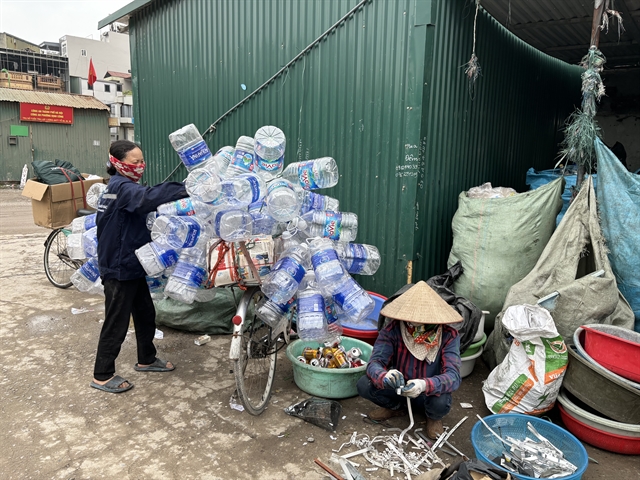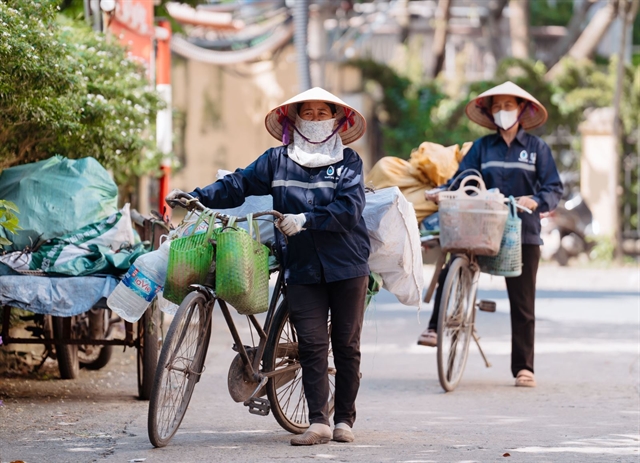 Environment
Environment

 |
| Freelance scrap collectors classify waste at a collecting point on Định Công Street, Hà Nội. — VNS Photo Khánh Dương |
Khánh Dương
HÀ NỘI — In Việt Nam, an army of around 3,000 freelance scrap collectors is quietly transforming the nation’s plastic waste, giving it a new life cycle, giving discarded materials a second chance while making a living from their efforts.
Each day, they collect domestic waste from neighbourhoods, transport it to collection points for sorting and send recyclable plastics to facilities where they are reborn as new products. Without their dedication, thousands of tonnes of plastic would likely end up polluting rivers, lakes or landfills.
Often unseen and underappreciated, these collectors form a vital link in Việt Nam’s circular economy, turning what many consider trash into an environmental treasure.
The network operates across major cities including Hà Nội, HCM City, Đà Nẵng and Cần Thơ, and was launched in 2021 as a joint initiative between VietCycle, a company specialising in plastic waste management and recycling, and Unilever Vietnam.
From an initial 1,200 members, the network has grown to about 3,000 today. Over the past five years, its members — mostly women — have collected more than 40,000 tonnes of plastic waste, helping to cut an estimated 160,000 tonnes of carbon emissions.
To support their essential work, collectors are provided with protective clothing, gloves, bicycles, essential goods, personal hygiene products and social insurance.
Lê Thị Lương, a veteran scrap collector who has worked around Bạch Mai Hospital in Hà Nội for 31 years, joined the network in 2021. Since then, she has attended two to three training sessions annually to improve her plastic sorting skills.
“Before 2021, I only knew a little about waste sorting. The training has taught me how to classify plastic properly and recognise which types have higher value,” she said.
Another member, Nguyễn Thị Cúc, who runs a scrap-collecting station in the Đại Kim area of Hà Nội, said she also benefited from fire safety training.
“Before attending the course, we only had regular fire extinguishers. After the training, we learned to equip our multi-storey house with escape ladders, water hoses and other fire safety tools,” she said.
While skills training improves efficiency, both women said the greatest reward has been social recognition.
“That’s the respect from other people,” Cúc told Việt Nam News.
“In the past, no one really paid attention to scrap collectors like us. Before joining the network, we never imagined that women like us could be recognised and honoured,” she said during a recent ceremony in Hà Nội marking Vietnamese Women’s Day (October 20).
“It makes life much happier. Since then, we’ve felt that our work has become far more meaningful,” Cúc said.
Lương added that waste collection was once viewed as an informal, overlooked occupation.
“When we used to go into small alleys to collect waste, people often looked down on us or even chased us away,” she said.
“Now, with people showing care and support, we feel happier and more motivated as if a burden has been lifted. When others no longer look down on us, it makes us feel much more positive and uplifted.”
Hoàng Đức Vượng, chairman of the board of VietCycle, said the company has built a circular ecosystem connecting green collection points, green stations and green factories. Collectors are no longer referred to by old names such as ve chai (bottle pickers) or đồng nát (scrap dealers) but proudly called “green warriors.”
Unique model
 |
| Freelance waste collectors with their bikes strolling around Hà Nội. — Photo courtesy of VietCycle |
Nguyễn Thái Huyền, an expert with the United Nations Development Programme (UNDP) who conducts research on freelance waste workers globally, said Việt Nam’s network of freelance scrap collectors is the only one of its kind in the world.
“It has a long-standing tradition of operation, extensive experience and a large membership. They can take pride in being a unique and commendable model compared with the rest of the world,” she said, adding that “other countries could look to this as an example to learn from.”
Hồ Kiên Trung, deputy head of the Việt Nam Environment Agency under the Ministry of Agriculture and Environment (MAE), said the project’s success is shown not only in figures but also in the strong transformation of public awareness and action.
“It clearly demonstrates that plastic waste is no longer invisible. It is now being recycled and reborn as a valuable resource, bringing economic benefits to both society and the nation,” he said.
Thanks to the tireless efforts of freelance waste workers, waste has truly become a resource. Even Việt Nam’s domestic waste is now beginning to be exported abroad, he added.
According to Trung, the 3,000 'green warriors,' most of whom are women, are themselves a powerful communication force that directly engages communities in waste sorting, collection and environmental protection activities.
“These women are also mothers, wives and neighbours. They are outstanding community ambassadors who help people better understand the importance of collecting, sorting and transforming waste into valuable resources,” he said.
Despite their vital contributions, more support is needed to improve the livelihoods of freelance waste collectors.
Associate Professor Nguyễn Đình Thọ, deputy head of the MAE’s Institute of Strategy and Policy on Agriculture and Environment, said freelance waste collectors still lack access to health insurance, social insurance and other social benefits.
He said plastic waste has one of the most harmful impacts on the environment, yet work in this field remains undervalued and underpaid.
Mentioning that the 2020 Law on Environmental Protection includes provisions on Extended Producer Responsibility (EPR), Thọ expressed hope that under the EPR mechanism, the responsibilities and contributions of producers and importers will be strengthened.
“From a policy-making perspective, we will advise the MAE to ensure that part of the EPR funding is reinvested to support freelance workers,” he said.
He also suggested developing a plastic waste collection app similar to Uber or Grab. Through the app, households, businesses, schools or hospitals could notify collectors when they have recyclable waste, reducing the time spent searching for materials.
Such a system could expand participation from the current 3,000 collectors to 10,000 or more, allowing anyone who wishes to contribute to join.
“Developing the app itself is not as important as raising awareness and providing training for students, communities and the public to participate actively," he said. "This would help ease the workload of collectors, reduce costs and increase their income.”
Trung from the Việt Nam Environment Agency said that to ensure practical benefits for the collectors, especially women, the materials they collect must be turned into valuable recycled products or raw materials for production.
“As I understand, VietCycle has already started the preliminary processing of collected plastic waste. We should continue to strengthen and expand this stage to create higher-value recycled materials,” he said.
By doing so, Việt Nam can establish a closed-loop process from waste collection and pre-processing to transforming waste into production materials. This not only increases the economic value of waste but also provides higher income opportunities for the collectors, he said. — VNS




